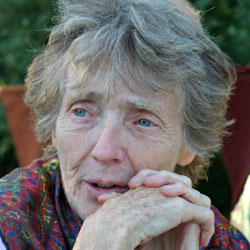I have seen it happen
A face with fangs and gills
represents history and an angel
is beating the beast on the back
Both are made of marble
One is a dragon
Its head is flat
like the iron tanks
in muddy water
that drove the men into the Gulf of Tonkin.
…
In my experience
the angel with his wings up
is trying to kill the dragon of history
to prove that air
is stronger than the objects in it
and if he wasn’t made of stone, he would.
Notes on the Poem
With Fanny Howe's poem "The Dragon of History", we're reminded of what interesting paths a poem can take us down. The poem, taken from Howe's 2005 Griffin Poetry Prize shortlisted collection On the Ground, offers a historical reference that of course, an attentive reader will want to learn more about and then, of course, might just pursue down unexpected avenues. Before we head down one of those intriguing pathways, let's pause to admire how this excerpt - the opening and closing sections of this poem - so beautifully frames the poem's possible theme or thesis. Contemplating some kind of historical monument ("both are made of marble"), we're asked to consider history as the figure of a dragon, in conflict with the figure of an angel. If the angel is some kind of symbol of religious or spiritual faith, are we to believe that faith prevails over what happened historically, or what the forces of the historical past can still unleash? The closing portion of the poem leaves us plenty to ponder. Amidst the concrete and symbolic images we're given to consider, the opening section of the poem makes a very specific historical reference, to the Gulf of Tonkin. Shrouded in mystery, military incidents in this region that have were not fully substantiated led to the intensification of tensions that ignited and escalated U.S. involvement in the Vietnam War in 1964. Political subject matter engaged Fanny Howe from an early age. She admits "Well, I had already been indoctrinated by my father who talked about politics with me over the dishes" in a 2013 interview. Deeply and evocatively informing her work throughout her life, it is fascinating to discover how Vietnam emerged early on in her life as an artist, in a somewhat surprising piece: the vintage nurse romance novel Vietnam Nurse, one of two VNRNs (yes, that's how one refers to them!) she wrote and published before her first forays into poetry. This review of the companion novel, West Coast Nurse - both novels were written by Howe using the pseudonym Della Field (Delafield was briefly her married surname) - praises how progressively characters and themes are presented. Although apparently that subversive energy wasn't sustained in Vietnam Nurse, it's clear that early in her journey as a writer, Howe was imbuing a genre that some might dismiss as lightweight with serious perspectives. Those perspectives fully inform her poetry and other work to the present.
